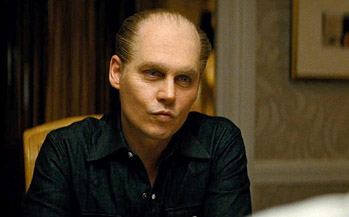|
|
Movie Review: Black MassBy Ben GruchowSeptember 23, 2015
Nothing else in Bulger’s half of the movie approaches the same amount of precision and activity; Rory Cochrane as Bulger associate Stephen Flemmi comes the closest, and Jesse Plemons’ hardcore loyalist Kevin Weeks registers in the brief screentime he’s allotted. In the other half of the movie, we have Joel Edgerton as FBI agent John Connolly; if you followed the real-world timeline of the Bulger/FBI partnership, you already know that Connolly essentially used the informant protection capabilities of his office to shield Bulger and his Winter Hill Gang from prosecution while simultaneously eliminating the Gang’s enemies and rivals. The movie is more ambiguous about this, at least initially, and Edgerton plays Connolly as a conflicted individual who feels bound by an ingrained sense of neighborhood loyalty while understanding, on many levels, that the arrangement wouldn’t pass any kind of ethical muster. All of this is presented by Cooper and DP Masanobu Takayanagi with a lot of class and depth, and Black Mass is an easy candidate for awards consideration on that basis, as well as for its flawless production design. It’s frequently not an “attractive” film, but it evokes a mood out of 1970s and 1980s Boston that’s grimy, dim, and cramped; it’s utterly convincing as a world, and that’s no small achievement when it comes to period pieces. Where Cooper and Takayanagi place the camera relative to these surroundings is just as important to establishing the movie’s mood, and they exhibit an impressive ability to cleanly draw focus to the separate elements of each frame without resorting to any kind of showiness.
|

|
|
|

|
Thursday, October 31, 2024
© 2024 Box Office Prophets, a division of One Of Us, Inc.


